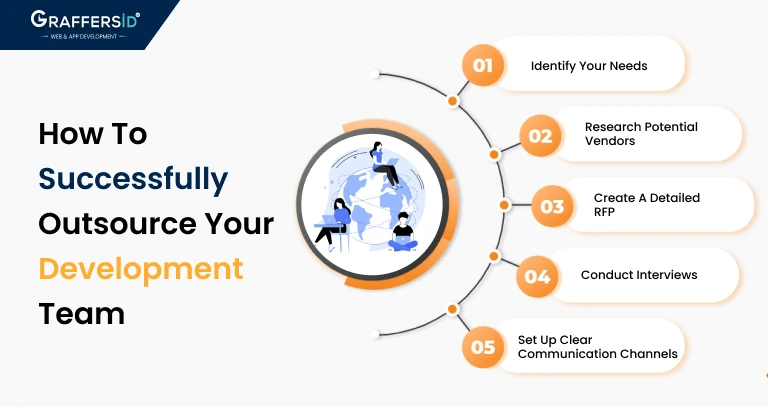Outsourcing is a business practice that has gained popularity in recent years, as more and more companies look for ways to increase efficiency and reduce costs. At its most basic, outsourcing involves hiring a third-party vendor to handle certain tasks or functions that are normally handled in-house. This can be done for a variety of reasons, including to take advantage of specialized expertise, access to lower-cost labor, or to free up internal resources for other purposes. In this blog post, we’ll explore the various outsourcing benefits, and how it can help them to achieve their business goals.
What is Outsourcing?
Outsourcing is a common business practice in which a company contracts with an external vendor or service provider to perform work that is typically done in-house. It can be a cost-effective way for businesses to access specialized expertise and resources, and it can also allow them to focus on their core competencies. However, outsourcing can also bring challenges, such as managing vendor relationships and ensuring the quality of the outsourced work.
A Brief History of Outsourcing
The history of outsourcing dates back to the early 20th century when companies began to outsource production to other countries to take advantage of lower labor costs and other economic advantages. In the 1980s and 1990s, the rise of the Internet and other technologies made it easier for companies to communicate and collaborate with external partners, leading to a significant increase in outsourcing.
In the 21st century, outsourcing has become a common practice in a variety of industries, including manufacturing, information technology, and customer service. Companies may choose to outsource tasks or services in order to reduce costs, access specialized expertise, or increase efficiency. However, outsourcing has also been controversial, as it can result in the loss of jobs for domestic workers and can raise concerns about the quality and security of the outsourced work.
Why Outsourcing has become more popular in recent years?
There are a number of reasons why outsourcing has become more popular in recent years:
- Cost savings: One of the primary reasons companies outsource is to save money. Outsourcing certain business functions to countries where labor is cheaper can significantly reduce a company’s operating costs.
- Access to specialized skills: Another reason companies outsource is to gain access to specialized skills or expertise that may not be available in-house. For example, a company may decide to outsource software development to a company that has specific expertise in that area.
- Improved efficiency: Outsourcing can also help a company become more efficient by allowing it to focus on its core competencies. For example, a company that outsources its human resources function can devote more time and resources to its core business activities.
- Flexibility: Outsourcing can also provide a company with greater flexibility. For example, a company may decide to outsource certain business functions on a temporary basis in order to meet increased demand or to handle a one-time project.
- Risk management: Outsourcing can also help a company manage risk by allowing it to transfer certain business functions to an external provider. This can be particularly useful for companies that operate in industries that are subject to regulatory change or other types of risk.
Want to hire dedicated remote developers? Get in touch with us now!
How Does Outsourcing Work?
Outsourcing is the process of contracting a business function to a third-party service provider. Companies may choose to outsource certain functions, such as manufacturing, information technology, or human resources, to other companies in order to focus on their core competencies and reduce operating costs.
There are several different models for outsourcing, including offshore outsourcing, where the service provider is located in a different country; nearshore outsourcing, where the provider is located in a nearby country and onshore outsourcing, where the provider is located within the same country as the company.
The process of outsourcing typically involves the following steps:
- Identifying the function or process to be outsourced
- Identifying potential service providers
- Requesting proposals from service providers
- Evaluating proposals and selecting a service provider
- Negotiating and finalizing the contract with the service provider
- Managing the outsourced relationship
Outsourcing can be a cost-effective way for companies to access specialized expertise or to take advantage of lower labor costs in other countries. However, it can also have drawbacks, such as the potential for communication issues and difficulties in managing a relationship with a third party.
What services do outsourcing companies offer?
Outsourcing companies offer a wide range of services, including:
- Information technology (IT) services: These include software development, application management, and technical support.
- Business process outsourcing (BPO): These services include customer service, human resources, finance, and accounting.
- Legal services: These services may include legal research, contract review, and patent filing.
- Engineering services: These services may include design, prototyping, and testing.
- Manufacturing: Companies may outsource the production of physical goods to outsourcing companies.
- Supply chain management: These services include procurement, logistics, and inventory management.
- Marketing and advertising: These services may include market research, social media management, and content creation.
- Translation and localization: These services involve translating content into different languages and adapting it for specific cultural markets.
Outsourcing companies may also offer specialized services in industries such as healthcare, energy, and telecommunications.
Outsourcing Benefits
Outsourcing has become a popular business strategy for companies looking to cut costs, improve efficiency, and access a wider pool of talent. There are many outsourcing benefits, including
- Cost savings: Outsourcing can lead to significant cost savings as businesses can take advantage of lower labor costs in other countries. This is especially true for companies that outsource manufacturing or production processes to countries with lower production costs.
- Improved efficiency: Outsourcing certain business functions to specialized companies can lead to improved efficiency and productivity. These companies often have the necessary expertise and resources to handle the task more efficiently than in-house staff.
- Access to specialized skills: Outsourcing can give businesses access to specialized skills and expertise that may not be available in-house. This is especially useful for small businesses that may not have the resources to hire specialized staff.
- Flexibility: Outsourcing allows businesses to be more flexible and adapt to changing market conditions. Companies can scale their outsourcing up or down depending on their needs, rather than being tied to a fixed in-house workforce.
- Focus on core competencies: Outsourcing non-core business functions allows companies to focus on their core competencies and strategic priorities. This can help businesses stay competitive and grow.
- Risk management: Outsourcing certain business functions can help mitigate risk as it allows companies to transfer certain responsibilities and potential liabilities to the outsourcing company.
- Improved customer service: Outsourcing customer service or technical support to companies with specialized expertise can lead to improved service levels and customer satisfaction.
Read Also: What you Need to Know about Software Development
How to Successfully Outsource Your Development Team

Outsourcing your development team can be a great way to access a wider pool of talent and potentially save on labor costs. However, it’s important to carefully consider your needs and do your due diligence when selecting a vendor. Here are some steps you can take to successfully outsource your development team:
- Identify your needs: Clearly define the scope of work and the skills and experience required for the project. This will help you determine the type of vendor you need to look for.
- Research potential vendors: Look for vendors that have a track record of successful projects in your industry and can provide references from satisfied clients. Consider factors such as their price, location, and ability to meet your timeline.
- Create a detailed request for proposal (RFP): An RFP is a document that outlines your project requirements and solicits proposals from vendors. Be sure to include details such as the scope of work, timeline, and budget.
- Review proposals and conduct interviews: Carefully review the proposals you receive and conduct interviews with the top contenders to assess their fit for your project.
- Negotiate the terms of the contract: Once you’ve selected a vendor, work with them to negotiate the terms of the contract, including the price, timeline, and any necessary deliverables.
- Set up clear communication channels: Establish regular check-ins and set up clear communication channels to ensure that the project stays on track.
- Monitor the project closely: Regularly review the progress of the project to ensure that it is on track and that the vendor is meeting your expectations.
By following these steps, you can increase your chances of success when outsourcing your development team.
How does outsourcing affect job availability in the domestic market?
Outsourcing can affect job availability in the domestic market in a number of ways. On the one hand, outsourcing can lead to the creation of new jobs in the domestic market, as companies may hire dedicated remote employees to manage the outsourced functions. On the other hand, outsourcing can also lead to job losses in the domestic market as companies may choose to shift certain tasks or functions to external providers. This can result in layoffs for domestic workers who were previously performing those tasks.
It is important to note that the overall impact of outsourcing on job availability in the domestic market can be complex and difficult to predict, as it depends on a variety of factors such as the specific industries and job functions that are being outsourced, the availability of skilled workers in the domestic market, and the overall state of the economy. In general, however, outsourcing can lead to both positive and negative impacts on job availability in the domestic market.
What are the best countries to outsource to?
There are many factors to consider when determining the best countries to outsource to. Some of the most important ones include the cost of labor, the availability of skilled workers, the quality of infrastructure and communication systems, the stability of the political and economic environment, and the cultural fit with your own business.
In general, some of the countries that are often considered to be good options for outsourcing include India, China, the Philippines, Vietnam, and Indonesia. These countries have large pools of educated and skilled workers. They often offer relatively low labor costs compared to countries in North America and Western Europe. However, it is important to do your own research and carefully evaluate the specific needs of your business before deciding where to outsource.
How do you manage an outsourced team effectively?
Effective management of an outsourced team requires good communication, clear goals and expectations, and regular check-ins. Here are some tips for managing an outsourced team effectively:
- Clearly define the roles and responsibilities of each team member. This will help ensure that everyone knows what is expected of them and can work effectively towards common goals.
- Establish clear lines of communication. Make sure that you have regular check-ins with your team, either through video conferencing or other communication channels. This will help ensure that everyone is on the same page and that any issues can be addressed in a timely manner.
- Set clear goals and expectations. It is important to set specific, measurable, achievable, relevant, and time-bound (SMART) goals for your team. This will help ensure that everyone is working towards the same objectives and can track their progress.
- Use project management tools. There are many tools available to help manage an outsourced team, such as Trello, Asana, and Basecamp. These tools can help you keep track of tasks, assign responsibilities, and monitor progress.
- Foster a culture of transparency. Encourage open communication and transparency within your team. This will help build trust and foster collaboration.
- Provide support and resources. Make sure that your team has the resources and support they need to be successful. This can include access to training, tools, and other resources.
- Recognize and reward good work. Show appreciation for your team’s hard work and dedication. This can help motivate them and build a positive team culture.
Conclusion
In conclusion, outsourcing benefits can greatly benefit businesses of all sizes. It allows companies to access a global pool of talent, reduce labor costs, and increase efficiency. It also allows businesses to focus on their core competencies, while the outsourced task is handled by professionals.
Outsourcing can also help businesses stay competitive in their industry by allowing them to take advantage of the latest technologies and best practices. It can also help reduce the burden of compliance and regulatory issues.
Overall, outsourcing can be a strategic move for businesses looking to streamline their operations, reduce costs, and stay competitive.
Connect With India’s #1 Outsourcing Company GraffersID
Are you tired of juggling multiple tasks and projects on your own? Do you need help scaling your business and increasing efficiency? Look no further than GraffersID, India’s #1 outsourcing company. Our team of highly skilled professionals is ready to take on your workload and help you reach your goals.
Don’t waste any more time trying to do it all on your own. Connect with GraffersID today and discover outsourcing benefits. With our cost-effective solutions and commitment to excellence, we can help you grow your business and achieve success.
So what are you waiting for? Take the first step and connect with India’s #1 outsourcing company now. Let GraffersID handle the rest and watch your business thrive.






